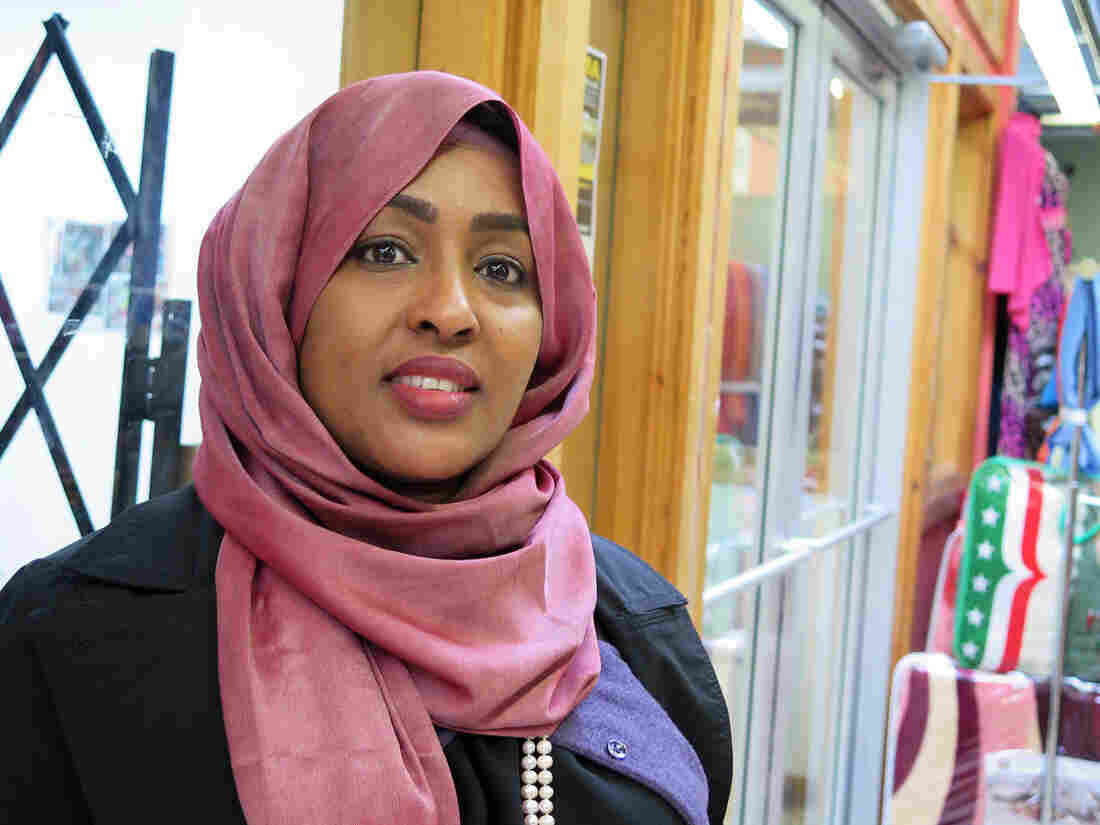Anti-vaccine groups Fighting fears in the Minnesota measles epidemic: Shots
Khadra Abdulle, a resident of St. Paul, stops to shop at the Riverside Market in the Cedar-Riverside neighborhood of Minneapolis. This is inaccurate information about a link between vaccines and autism, she says, which keeps well-meaning parents from having their children immunized against measles.
Mark Zdechlik / MPR
hide the legend
tipping the legend
Mark Zdechlik / MPR![]()
Khadra Abdulle, a resident of St. Paul, stops to shop at the Riverside Market in the Cedar-Riverside neighborhood of Minneapolis. This is inaccurate information about a link between vaccines and autism, she says, which keeps parents well-intentioned to have their children immunized against measles.
Mark Zdechlik / MPRHealth officials in Minnesota fought to contain a measles epidemic that primarily sickened American Somali children in the state. So far, health officials have identified 34 cases, still mainly in Hennepin County, and they worry that there will be more.
In Minnesota, the vast majority of children under the age of two are vaccinated against measles. But health officials say most Americans in Somalia and 2 years have not had the vaccine, or about six out of ten. As the outbreak spreads, this statistic worries health officials, including Michael Osterholm, who heads the Center for Research and Policy on Infectious Diseases at the University of Minnesota.
"This is a very concentrated number of unvaccinated people," he said. "This is a potential type of gas and match situation."
Measles is a highly contagious respiratory disease that causes a rash and fever. This can be fatal, but the Centers for Disease Control and Prevention say two doses of vaccination are about 97%. 100 effective to get out of the disease.
The Minnesota Department of Health says the epidemic began in Hennepin County, home of Minneapolis and in the heart of the US Somali community.
US Somali leaders firmly agree with the minnesota health department in trying to reverse pseudoscience behind the unfounded claims that vaccination can lead to autism. But anti-vaccine groups have been quick to elicit fears even when the outbreak spreads.
A social and commercial center of the community is the Cedar-Riverside neighborhood, adjacent to downtown Minneapolis. Within a building called the Riverside Mall, more than a dozen booths are tightly clustered, in the open air.
Climbing from the stall to the stall are colorful clothes and other textiles as well as small items of furniture. Most Americans who buy here do not want anything to do with the issues of a reporter. But Khadra Abdulle offers his opinion on the measles epidemic.
"I heard [about]," she said, "but I have not seen it. I do not know anyone who has this problem right now."
She quickly calls the fear that is fighting the measles vaccine among Somali Americans.
"They believe that it causes autism."
A weekend meeting in Minneapolis, organized by anti-vaccine groups (the Minnesota Vaccine Safety Council of Minnesota, the Minnesota National Health Freedom and the Minnesota Vaccine Freedom Coalition and The Organic Consumers Association) attracted dozens of Somali-Americans. Some members of the public shouted doctors - including the pediatrician, Dr. Stacene Maroushek - who came forward to try to convince them, vaccination is crucial.
"We know that there is less of a certain vaccination rate, the virus is much more likely to spread," she said. "This is a scientific fact"
Kris Ehresmann, director of the Infectious Diseases Division at the Minnesota Department of Health, described the Minnesota measles epidemic as a "nightmare of Public health "- many unvaccinated people living in dense conditions Populated neighborhoods and a highly contagious disease.
Ehresmann says that it is beyond the frustration of the campaign of disinformation by anti-vaccinated defenders, who have worked against the efforts to contain the epidemic.
"I will be honest, it makes me very angry," she said.
But Ehresmann says that the desire to get the truth is to mobilize public health officials.
"We had people on Somali television, Somali radio, we participated in discussion rooms. The Commissioner met with imams to talk to them about how we can work with the community. The faith to make awareness, "she said.
In 2000, United States public health officials reported that measles had been eliminated in the United States through a robust vaccination program. This means that measles is no longer native to the United States, but as vaccination rates have been eroded in some areas, it can spread quickly if a sick traveler brings it.
By 2014, there were 667 cases in the United States, including a large epidemic among Amish communities in Ohio. By 2015, there were 188 cases, some related to an outbreak that started at the Disneyland Park Disneyland. Pre-vaccination is essential to prevent people from contracting the virus if they are exposed to it.
Nearly 30 years ago, measles suffered 460 people in Minnesota and three children died in this epidemic. Osterholm served as a state epidemiologist at the time and stated that these dead persuade him still. He feared that this would happen again.
"I think we could certainly see a major increase in the number of cases beyond what we have now," he said. "With that comes the growing probability that someone will die."
This story is part of a reporting partnership with NPR, Minnesota Public Radio and Kaiser Health News.
HEALTH COACH -





Comments
Post a Comment